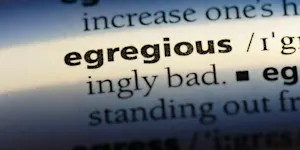What Makes This Word Tick
"Desuetude" is one of those words that feels as comfortable as an old armchair in the attic, inviting you to sit down and reminisce about its heyday. It's a noun that means a state of disuse or inactivity. Think of it as the forgotten bicycle in the garage or an ancient law that hasn't seen the light of courtrooms in decades.
If Desuetude Were a Person…
If Desuetude were a person, it would be the wise old sage sitting on the porch, regaling you with tales of how things used to be—before everything went electric and digital. With a twinkle in its eye, it cherishes the dusty record players and rotary phones of yesteryear.
How This Word Has Changed Over Time
In its earlier days, "desuetude" was used more frequently, especially in legal and formal contexts. Over time, as the concept of obsolescence has, well, become obsolete in our fast-paced world, this word, ironically enough, found itself slipping into desuetude.
Old Sayings and Proverbs That Use Desuetude
While not appearing directly in proverbs, "desuetude" embodies the spirit of sayings like "Use it or lose it" or "What you don’t use, you lose." It serves as a gentle reminder that neglect leads to obsolescence.
Surprising Facts About Desuetude
The word "desuetude" originates from Latin roots, hinting at just how long it's been accompanying humanity. It's not just about random objects becoming outdated; historically, desuetude has also referred to old habits and traditions falling by the wayside.
Out and About With This Word
Desuetude isn't just confined to dusty old books. In today’s world, it might pop up in town meetings discussing unused municipal property or in discussions about bygone technologies—like the VHS collection in your basement.
Pop Culture Moments Where Desuetude Was Used
While not a pop culture regular, "desuetude" might make a cameo appearance in a British period drama or a documentary on ancient customs, providing just the right amount of gravitas and nostalgia.
The Word in Literature
"Desuetude" frequently finds its natural habitat in the pages of literary works, especially those delving into historical fiction or the elegiac reflections of poets who muse about times past and the inexorable march of change.
Moments in History with Desuetude
Consider the industrial revolution: a time when many artisanal crafts fell into desuetude, replaced by mass manufacturing. Desuetude reflects those poignant historical shifts where old ways quietly fade into history.
This Word Around the World
Around the globe, every culture has items and traditions that fall into desuetude. In France, it might be the quiet rural customs eclipsed by urban sprawl, while in Japan, it could be ancient festivals overshadowed by modern life.
Where Does It Come From?
The etymology of "desuetude" traces back to the Latin word "desuetudo," meaning "disuse," which combines "de-" (meaning "away") with "suescere" (meaning "to become accustomed"). It's been in the English lexicon since the early 17th century.
How People Misuse This Word
Some might misunderstand "desuetude" as being synonymous with "broken" or "antique." However, it's more about the process of falling out of regular use rather than being physically unusable.
Words It’s Often Confused With
Obsolete: While both describe something out of use, "obsolete" implies complete disuse, while "desuetude" can allow for a revival.
Dormant: This is often confused due to the inactivity aspect, but "dormant" suggests the possibility of reactivation, like a sleeping volcano.
Abandoned: While they share a sense of neglect, "abandoned" more strongly suggests a deliberate act of giving up or leaving something behind.
Additional Synonyms and Antonyms
Synonyms: Inactivity, disuse, neglect
Antonyms: Use, activity, engagement
Want to Try It Out in a Sentence?
How about this: "The quaint railway station fell into desuetude after the new high-speed train line was built, transforming the once-bustling hub into a silent monument of the past."
















